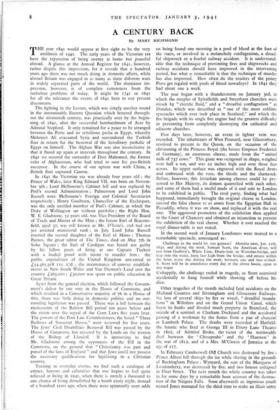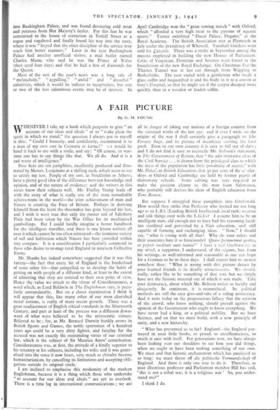A CENTURY BACK
By MARY RICHMOND
THE year 1841 would appear at first sight to be the very antithesis of 1941. The early years of the Victorian era have the reputation of being stormy at home but peaceful abroad. A glance at the Annual Register for 1841, however, rather dispels this impression, for it reveals that a hundred years ago there was not much doing in domestic affairs, while abroad Britain was engaged in as many as three different wars in widely separated parts of the world. The dominant im- pression, however, is of complete remoteness from the turbulent problems of today. It might be 1741 or 1641 for all the relevance the events of 1841 have to our present discontents.
The fighting in the Levant, which was simply another round in the interminable Eastern Question which festered through- out the nineteenth century, was practically over by the begin- ning of 1841, after the successful bombardment of Acre by Admiral Stopford. It only remained for a peace to be arranged between the Porte and its rebellious pasha in Egypt, whereby Mehemet Ali evacuated Syria and surrendered the Turkish fleet in return for the bestowal of the hereditary pashalic of Egypt on himself. The Afghan War was also inconclusive in that it flared up again at intervals throughout the century. In 1841 we secured the surrender of Dost Mahomed, the former ruler of Afghanistan, who had tried to oust his pro-British successor. In the course of our opium war with China, a British fleet captured Canton.
In 1841 the Victorian era was already four years old ; the Prince of Wales, later King Edward VII, was born on Novem- ber 9th ; Lord Melbourne's Cabinet fell and was replaced by Peel's second Administration ; Palmerston and Lord John Russell were Melbourne's Foreign and Colonial Secretaries respectively ; Henry Goulburn, Chancellor of the Exchequer, was the only untitled member of Peel's Cabinet, in which the Duke of Wellington sat without portfolio ; the Right Hon. W. E. Gladstone, 32 years old, was Vice-President of the Board of Trade and Master of the Mint ; the future Earl of Beacons- field, aged 37, was still known as Mr. D'Israeli, and had not yet attained ministerial rank ; in July Lord John Russell married the second daughter of the Earl of Mint° ; Thomas Barnes, the great editor of The Times, died on May 7th in Soho Square ; the Earl of Cardigan was found not guilty by his fellow peers of firing at one Captain Tuckett with a loaded pistol with intent to murder him ; the public expenditure of the United Kingdom amounted to £54,465,318 I is. 21d. ; the maintenance of convict establish- ments in New South Wales and Van Diemen's Land cost the country £265,000 ; L30,00o was spent on public education in Great Britain.
Apart from the general election, which followed the Govern- ment's defeat by one vote in the House of Commons, and which resulted in a Conservative majority of 76 in a House of 66o, there was little doing in domestic politics and no out- standing legislation was passed. There was a lull between the excitements of the Reform Bill period ten years before and the storm over the repeal of the Corn Laws five years later. The powers of the Poor Law Commissioners, the hated " Three Bashaws of Somerset House," were renewed for five years. The Jews' Civil Disabilities Removal Bill was passed by the House of Commons, but rejected by the Lords on the motion of the Bishop of Llandaff. It is interesting to find Mr. Gladstone among the opponents of the Bill in the Commons, on the ground that " Christianity was part and parcel of the laws of England " and that Jews could not possess the necessary qualifications for legislating in a Christian country.
Turning to everyday events, we find such a catalogue of crimes, horrors and calamities that one begins to feel quite relieved at living in 1941, when there is merely a thousand to one chance of being demolished by a bomb every night, instead of a hundred years ago, when there were apparently even odds on being found one morning in a pool of blood at the foot of the stairs, or involved in a melancholy conflagration, a dread- ful shipwreck or a fearful railway accident. It is understand- able that the technique of preventing fires and shipwrecks and railway accidents should have improved in the intervening period, but what is remarkable is that the technique of murder has also improved. How often do the readers of the penny Press get regaled with pools of blood nowadays? In 1841 they had about one a week.
The year began with a thunderstorm on January 3rd, in which the steeples of Spitalfields and Streatham churches were struck by " electric fluid," and a " dreadful conflagration " at Dundee, which was described as " one of the most sublime spectacles which ever took place in Scotland," and which the fire brigade with its single fire engine had the greatest difficulty in preventing from completely destroying the cathedral and adjacent churches.
Five days later, however, an event in lighter vein was recorded. The inhabitants of West Pennard, near Glastonbury, resolved to present to the Queen, on the occasion of the christening of the Princess Royal (the future Empress Frederick of Germany), an enormous cheese, made from the " united milk of 737 cows." This giant was octagonal in shape, weighed over half a ton, and was 22 inches high and over three feet across. Its upper surface was engraved with the Royal Arms and embossed with the rose, the thistle and the shamrock. Before, however, this leviathan among cheeses could be pre- sented to Her Majesty, its donors quarrelled with each other, and some of them had a model made of it and sent to London to be exhibited in public. The rival party, finding what had happened, immediately brought the original cheese to London, ejected the false cheese vi et armis from the Egyptian Hall in Piccadilly, where it was on show, and replaced it with the real one. The aggrieved promoters of the exhibition then applied to the Court of Chancery and obtained an injunction to prevent the exhibition of the real cheese. Whether it ever reached the royal dinner-table is not stated.
In the second week of January Londoners were treated to a remarkable spectacle, announced as:
Challenge to the world fat too guineas! Monday next, Jan. rrth, 1841, and during the week, Samuel Scott, the American diver, will run from Godfrey's, White Lion, Drury-lane, to Waterloo-bridge, and leap into the water, forty feet high from the bridge, and return within the hour, every day during the week, between one and two o'clock. S. Scott will be in attendance every day at the above house, open to any wager
Unhappily, the challenge ended in tragedy, as Scott contrived accidentally to hang himself while showing off before his dive.
Other tragedies of the month included fatal accidents on the Midland Counties and Birmingham and Gloucester Railways, the loss of several ships by fire or wreck, " dreadful inunda- tions " in Wiltshire and on the Grand Union Canal, which burst its banks and flooded much property in Brentford, the suicide of a sentinel at Chatham Dockyard and the accidental gassing of a workman by the fumes from a pan of charcoal at Lambeth Palace. The deaths were recorded of Hatfield, the lunatic who fired at George III in Drury Lane Theatre in 1802, of Admiral Broke, the victor of the memorable duel between the ' Chesapeake' and the ' Shannon' in the war of 1812, and of a Mrs. M'Unwin of Jamaica at the age of 117.
In February Camberwell Old Church was destroyed by fire ; Prince Albert fell through the ice while skating in the grounds of Buckingham Palace ; Wynyard, the seat of the Marquess of Londonderry, was destroyed by fire, and two houses collapsed in Fleet Street. The next month the whole country was taken in for some days by a remarkable hoax account of the destruc- tion of the Niagara Falls. Soon afterwards an ingenious youth named Jones managed for the third time to make an illicit entry into Buckingham Palace, and was found devouring cold meat and potatoes from Her Majesty's larder. For this feat he was committed to the house of correction in Tothill Street as a rogue and vagabond and finally found his way into the navy, where it was " hoped that the strict discipline of the service may teach him better manners." Later in the year Buckingham Palace had another unofficial visitor, a mad butler named Charles Mann, who said he was the Prince of Wales (then aged four days) and that he had a box of diamonds for the Queen.
Most of the rest of the year's news was a long tale of " melancholy," " appalling," " awful " and " dreadful " calamities, which it would be tedious to recapitulate, but one or two of the less calamitous events may be of interest. In April Cambridge won the " great rowing match " with Oxford, which " afforded a very high treat to the patrons of aquatic sports." Turner exhibited " Ducal Palace, Dogano," at the Royal Academy. The British Association met at Plymouth in July under the presidency of Whewell. Vauxhall Gardens were sold for £20,200. There was a strike in September among the masons employed in building the new Houses of Parliament. Coins of Vespasian, Domitian and Severus were found in the foundations of the new Royal Exchange. On Christmas Eve the Thames Tunnel was at last cut through from Wapping to Rotherhithe. The year ended with a gentleman who made a glass coffin and bequeathed it and his body in it to a cousin at Guy's Hospital, so that he might see if the corpse decayed more quickly than in a wooden or leaden coffin.































 Previous page
Previous page